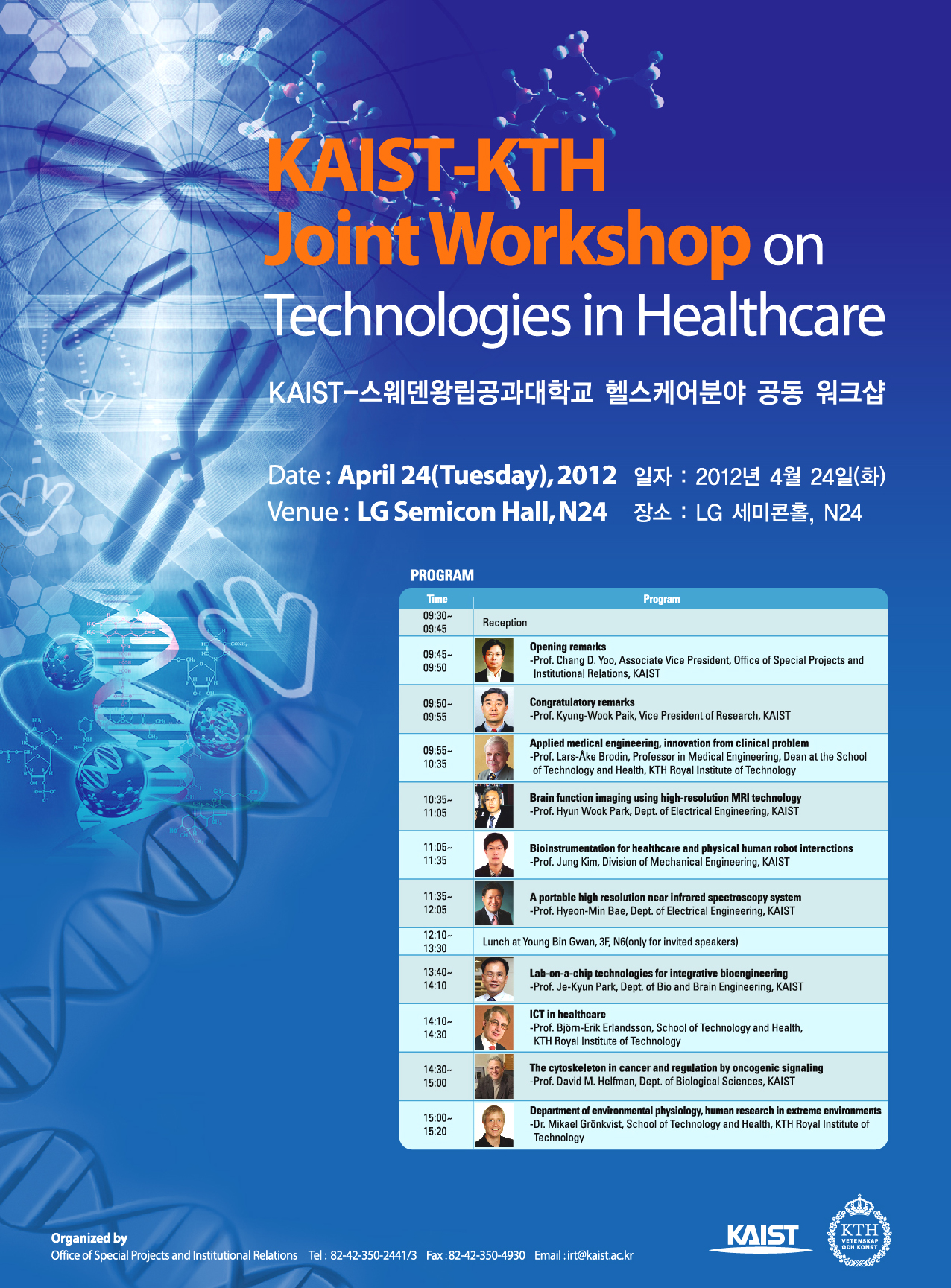event
KAIST and the KTH Royal Institute of Technology (KTH), Sweden, host a joint workshop on healthcare technologies on Tuesday, April 24, at the LG Semicon Hall (N24).
Open to the public, the workshop will proceed with presentations and discussions by participants from both institutions. Presentation topics and speakers are as follows:
“Applied medical engineering, innovation from clinical problems” by Professor Lars-Åke Brodin, Dean of School of Technology and Health, KTH
“ICT in healthcare” by Professor Björn-Erik Erlandsson, School of Technology and Health, KTH
“Department of environmental physiology, human research in extreme environments” by Researcher Mikael Grönkvist, School of Technology and Health, KTH
“Brain function imaging using high-resolution MRI technology” by Professor Hyun Wook Park, Department of Electrical Engineering, KAIST
“Bioinstrumentation for healthcare and physical human robot interactions” by Professor Jung Kim, Division of Mechanical Engineering, KAIST
“A portable high-resolution near-infrared spectroscopy system” by Professor Hyeon-Min Bae, Department of Electrical Engineering, KAIST
“Lab-on-a-chip technologies for integrative bioengineering” by Professor Je-Kyun Park, Department of Bio and Brain Engineering, KAIST
“The cytoskeleton in cancer and regulation by oncogenic signaling” by Professor David M. Helfman, Department of Biological Sciences, KAIST
Professor Chang Dong Yoo, Associate Vice President of Office of Special Projects and Institutional Relations at KAIST, who organized the workshop, says “Aging population and health issues are driving the demand for more sophisticated medical devices, procedures, and most importantly, qualified scientists and engineers specialized in health-related fields. This joint workshop will be a great chance to share new ideas and develop joint research between two leading research-oriented universities in two countries.”
Partially supported by LG Ericsson in Korea, the workshop is funded largely by the generous donation, made last June by a Swedish couple, to KAIST scholar exchange program.
The couple (Rune Jonasson and Kerstin Jonasson) donated 70 million krona (about 11.8 billion Korean won) to KTH last year and requested that some portion of the sum be used for a scholar exchange program with KAIST. The wife of the couple, Kerstin Jonasson, participated in the Korean War as a nurse, and upon her wish for further development in Korea’s science and technology, KAIST and KTH decided to use the donation for research in the field of healthcare and for a post-doc researcher exchange program.
KTH is a world-class university of Sweden and has produced numerous researchers for private enterprises, like Ericsson, and venture businesses. Since 1988, KTH offers a top notch program for information technology; the School of Information and Communication Technology is located in the Kista district, a vibrant cluster of information and communications technology industries in Sweden, and has taken on the crucial role of supplying personnel to the Kista Science Park as well as to academic-industrial cooperation.
For any inquiries, please contact the International Relations Team at +82-42-350-2441 (email: jungillee@kaist.ac.kr).

-
research A Mathematical Model Shows High Viral Transmissions Reduce the Progression Rates for Severe Covid-19
The model suggests a clue as to when a pandemic will turn into an endemic A mathematical model demonstrated that high transmission rates among highly vaccinated populations of COVID-19 ultimately reduce the numbers of severe cases. This model suggests a clue as to when this pandemic will turn into an endemic. With the future of the pandemic remaining uncertain, a research team of mathematicians and medical scientists analyzed a mathematical model that may predict how the changing transmissio
2022-02-22 -
people Top 10 Emerging Technologies by World Economic Forum
The World Economic Forum’s Meta-Council on Emerging Technologies announced its annual list of breakthrough technologies, the “Top 10 Emerging Technologies of 2016,” on June 23, 2016. The Meta-Council chose the top ten technologies based on the technologies’ potential to improve lives, transform industries, and safeguard the planet. The research field of systems metabolic engineering, founded by Distinguished Professor Sang Yup Lee of the Chemical and Biomolecular Engineer
2016-06-27 -
fund Kaist expresses appreciation to a Swedish nurse served in the Korean War and donated a scholarship.
Public release date: 19-Dec-2011 [ Print | E-mail | Share ] [ Close Window ] Contact: Lan Yoon hlyoon@kaist.ac.kr 82-423-502-295 The Korea Advanced Institute of Science and Technology (KAIST) Kaist expresses appreciation to a Swedish nurse served in the Korean War and donated a scholarship The largest private donation ever given to KTH Royal Institute of Technology in Stockholm, Sweden, will include a scholarship for KAIST students to study there The largest private donation
2011-12-23 -
people Ten Breakthroughs of the Year 2011 by Science
Porous Zeolite Crytals Science, an internationally renowned scientific journal based in the US, has recently released a special issue of “Breakthrough of the Year, 2011,” dated December 23, 2011. In the issue, the journal introduces ten most important research breakthroughs made this year, and Professor Ryong Ryoo, Department of Chemistry at KAIST, was one of the scientists behind such notable advancements in 2011. Professor Ryoo has been highly regarded in
2011-12-23 -
people, fund Board Chairman Chung Makes First Visit to Building Named After Him
Moon-Soul Chung, chairman of the KAIST board of trustees, visited the building built with his donation on Monday (Oct. 19) for the first time since he made the deed of gift eight years ago, university authorities said on Monday (Oct. 19). In 2000, Chung, founder and former CEO of Mirae Corp, manufacturer of semiconductor testing equipment, announced retirement and handed over the presidency of his company to one of his managing directors. One year later in 2001, he donated 30 billion won,
2009-10-20